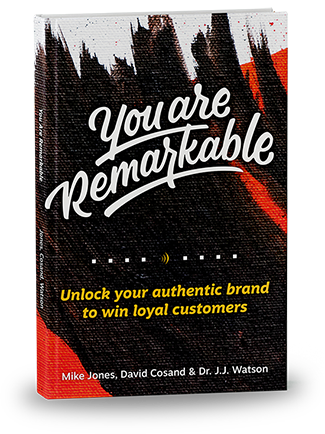Listing a set of values is pretty easy. But if you don’t allow yourself and your staff the time and energy to build your values into a culture, the values will never have the power to build your brand. Let’s talk about values and how to get past those roadblocks so your brand can benefit from your convictions.
I’ve heard that many companies fail because they’re underfunded. They have a great idea but just don’t get enough funding to fully realize that idea. That funding pays for resources and affects quality. It pays for advertising and communication. And it pays for something we don’t always allow for: sufficient time to plan, think and build processes and people. And it’s for this same reason that your values may not have the proper resource allocation to really make a difference and deliver the brand energy that can really make a difference for your company.
There are three main roadblocks to living out your values daily in your organization. They have to do with culture fit, definition and execution. All of which, if underfunded, could be impossible to fix.
Your Values Don’t Fit Your Culture
Let’s talk about the myth that we should stand for “everything good.” Now all you need is a nice rainbow logo, and you’re set, right? Wrong. We have to be specific about our values and understand how they support our work and give it beauty and context. To understand the possible conflict a little better, consider the following “good” values and the priorities of companies. What about a company whose culture is focused more on people, but with values that focus on the environment. Or environmentalist values in a company whose culture is focused on cheap energy creation. What about values that reflect a desire to alleviate people’s pain and help them not stress so much in a culture that promotes self-discipline? None of these are necessarily contradictions. Maybe they just take some explanation. On the other hand, maybe they’re straight contradictions, and nobody really understands.
Let’s talk about how your personal values fit into your business. All of your company values should fit in with your personal values, but not all of your personal values need to fit into your company values. Because sometimes they’re not relevant to your company and the kinds of work you do. For example, Chick-fil-A founder regrets that he ever mentioned his thoughts about homosexuality because he feels it has nothing to do with how he runs his business. In other words, he doesn’t regret his Biblical values; he just regrets they were brought into a discussion about his company. His Biblical values could have a lot to do with his company’s reputation for how it treats people and its service. But not every one of them is the most helpful in operating your business.
And what about superficial values? Let’s face it. Not every company searches its heart to find the values that most represent who they are and who they want to be. Some people just looked up “corporate values” on the internet. These values aren’t likely to matter to you, and your employees will be able to tell pretty much right away that the values don’t really matter to their jobs.
Want to give it a test? Try this. Ask your managers and key staff to tell you how each of your company values applies in their area and have them rate each one in relevance. Then talk about why. Maybe that value that everyone’s ranking low is just misunderstood and needs to be reworded. Or maybe you find that a key value is actually strong and interesting. Maybe it really gets people going. In any case, you can have your team co-create and test your set of values with you.
Your Values are Too Vague
Many times, when values aren’t lived out fully, it’s because they lack specificity and practical meaning. Can they be used every day? How does it apply to my job, and how will I know if I’m applying them to my job? Here are a few examples of values that are just too poorly defined.
Integrity. What does this mean to you, at a philosophical level? Isn’t this just a basic thing we should all pursue? Do you just mean “We don’t lie?” Or “We don’t cheat?”
Quality. Quality is good. It’s the first stop. But it should be developed from here. What’s our promise? McDonald’s can’t promise the best-tasting burgers, but it can promise consistency. Those are both definitions of quality. So does McDonald’s promise overall “quality,” or are they just promising consistency? This has the added benefit of being specific enough to build on. In other words, if consistency is your promise, then that can apply to burgers, speed through the drive-thru, customer service and even paid invoices to vendors.
Diversity. Diversity sounds good, but what do we mean by it? We hardly ever mean diversity, because diversity is not an end in itself. Usually, we mean respect for people of other backgrounds, respect for human dignity, or the creative pursuit of seeking out other points of view for creative purposes (but then our value might be “creativity.”) Is it diversity of workflows? Probably not. You need team players. Is it diversity of skin color? Some would call that a little simple-minded and superficial to think that skin color is any deep form of diversity. Usually, companies value diversity when a diverse point of view is what’s needed to solve a particular problem. Be careful that you don’t choose a value simply to appear politically correct. It could rob you of the respect of your team and even make you take yourself less seriously.
Exercise: Have everyone define the values and what it means to live it out. Have customers do the same. If you have a wide margin of definition, sharpen your terminology.
Your Values Don’t Reply to the Everyday
If your values aren’t relevant to the everyday work, or people don’t see how they fit, they won’t be top-of-mind, and they won’t grow in strength in the hearts and minds of your staff. Make them practical through testing and use. Do these values make sense in the lowest-paid positions you have in the organization? Do contractors, partners and employees see your values in their everyday interactions?
Exercise: Have each of your managers think of 3 ways your values can be shared and synthesized at the lowest levels in the organization.
Summary
Listing a set of values is easy. Many companies formulate values but never see the benefit. Either they choose values that don’t fit or are too vague or they just can’t put them to work daily. But if you understand what it takes to do it right, and allocate the time, thought, and practical execution necessary, you might start seeing a real renaissance of pride in the values of your organization, starting from the inside, but emanating outward. And these are the rumblings of a brand that’s about to matter.
Don’t have a set of brand values? You may benefit from a brand workshop with us. You get a set of values, personality traits, and brand story. And if you really get crazy, you can get into design work and even an implementation plan.



